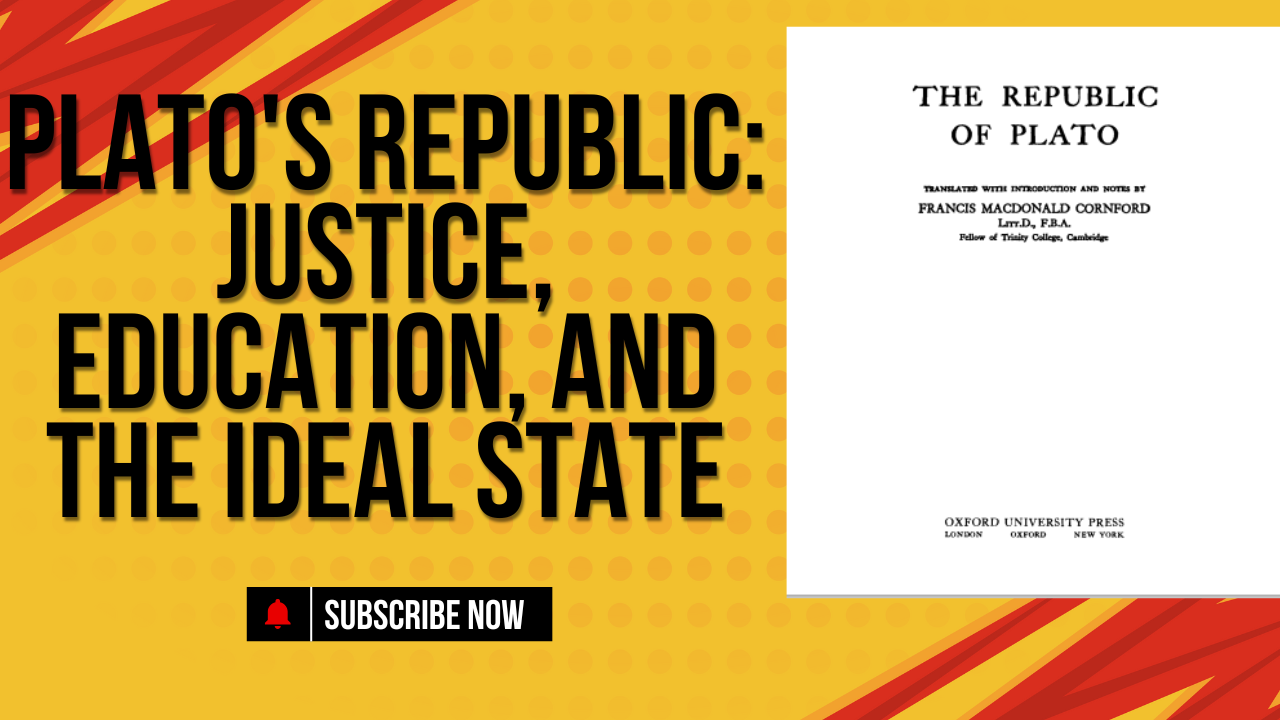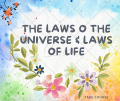
This text is a selection from Francis Cornford’s 1941 translation of Plato’s Republic, focusing on Book I through Book IX. The excerpt explores Socrates’ dialogues concerning the nature of justice, beginning with simple definitions and progressing to a complex analysis of justice within the individual and the state. Socrates refutes various conceptions of justice, including that it is merely following laws or the interests of the powerful. He then constructs an ideal state to illustrate his theory, detailing its organization and the education of its “Guardians.” The text culminates in a comparison of the just and unjust life, arguing that justice is intrinsically valuable and leads to happiness.

State According to Plato’s Republic
- What are the initial definitions of justice explored and why are they rejected? The dialogue begins by considering several common notions of justice. Cephalus suggests justice is simply being honest and repaying debts, but this is quickly dismissed through a counterexample of returning a weapon to a madman. Polemarchus argues for justice as helping friends and harming enemies, but this idea is challenged by the idea that we could harm good people if we misidentify who our true friends or enemies are. This definition is also shown to contradict the idea that a just man would never want to harm anyone, even an enemy. Finally, Thrasymachus proclaims justice to be the interest of the stronger party, which initially refers to the ruling power, but shifts to the idea of the ruler as skilled and always acting in his own best interest. All these definitions fail to be universal or logically consistent and are shown to have major flaws.
- How does Thrasymachus’s view of justice as the “interest of the stronger” evolve and why does Socrates ultimately refute it? Initially, Thrasymachus defines “the stronger” as the ruling party, implying that laws are merely tools for the powerful to maintain their position, and are made to serve their interests. However, Socrates leads him to refine this to the idea of the true ruler as a person who is skilled and doesn’t make mistakes in their craft or in governing. By drawing analogies to arts like medicine and navigation, Socrates then demonstrates that the true craftsman/ruler does not act in their own interest but in the interest of those they serve. Furthermore, Socrates shows that injustice can only weaken a group, even robbers, demonstrating that a unified community, including a just man, is more powerful than an unjust one. The final refutation establishes that injustice, when taken to its extreme, is self-destructive.
- What is the significance of the story of Gyges’ ring in the context of the discussion about justice? The myth of Gyges’ ring, which grants invisibility, is used to illustrate the common belief that people act justly only out of fear of consequences. Glaucon uses this as an illustration that if a just and an unjust man were both to acquire a ring that allowed them to act without being caught, they would both act unjustly because they see it as the natural way to achieve personal goals. It emphasizes the idea that people see justice as a burden and that injustice is ultimately preferable if one can get away with it. It is used to raise a crucial question: Is justice intrinsically valuable, or is it only valued for its external rewards and consequences? This serves as the central puzzle that Socrates will seek to solve as the dialogue continues.
- Why does Plato shift the focus from individual justice to justice in the state? Plato proposes examining justice in the state first, reasoning that justice may be more easily discernible on a larger scale. He suggests that justice in an individual is merely a smaller reflection of the same principles that govern justice in society, so it is worthwhile to explore the ideal state before trying to define the just individual. By examining how the state is formed, they believe they can better understand the nature of justice.
- How does Plato construct his ideal state, and what are its key features? Plato’s ideal state arises from the recognition of mutual human needs and the idea of specialization. The state is initially designed to meet basic needs such as food, shelter, and clothing through specialized classes. Plato then introduces a more luxurious state to show how an appetite for more than basic needs leads to conflict and the necessity of a warrior class (Guardians). The Guardians are tasked to protect the state, and later are divided between the lower class Guardians (warriors) and a philosopher-ruler class who ultimately direct the state. All members of society fulfill their functions according to their natural aptitudes, leading to social harmony, the core virtue of the just state.
- What is the role of education in Plato’s ideal state and what is the purpose of censorship? Education is crucial for developing the right kind of citizens, especially the Guardians, in Plato’s state. The education of the Guardians emphasizes the harmonious development of the soul via a combination of both physical and mental training. It heavily relies on gymnastics, to develop the body and spirited part of the soul, and music (broadly understood to include the arts and poetry), to develop the rational and philosophical aspects. Censorship of literature and art is essential to ensure the young are only exposed to virtuous examples, reinforcing the values the state seeks to cultivate in its citizens.
- How does Plato connect the structure of the state with the structure of the individual soul? Plato posits that the state mirrors the individual soul, which also consists of three parts: reason, spirit, and appetite. The state’s three classes – rulers, auxiliaries, and producers – correspond to these three parts of the soul, respectively. In a just individual, reason rules over the spirited and appetitive parts of the soul, just as in the ideal state, the philosopher-kings rule with wisdom over the auxiliaries (spirited) and the producers (appetitive). Justice, for the individual as well as for the state, arises from maintaining a harmony and proper balance between these parts.
- What is the ultimate argument for why a just life is better than an unjust life according to Plato? Plato concludes that the just life is the happier life by emphasizing that each thing, including the soul, has a function and a virtue which enables it to fulfil that function well. The function of the soul is to live and to deliberate. If the soul is operating at peak performance it is in the state of virtue, and if it is in a state of virtue, it lives well and therefore experiences happiness. The just person allows reason to guide their soul, thereby achieving a state of harmony and well-being. In contrast, the unjust person allows the desires of their appetite to overrule the better parts of themselves, leading to inner turmoil and unhappiness. Ultimately, the just life is not only morally superior but also leads to a deeper, more fulfilling happiness by virtue of a harmonious soul.
A Study Guide for Plato’s Republic (Books I-IV)
Quiz
Answer the following questions in 2-3 sentences each.
- According to Cephalus, what is justice, and what motivates his definition?
- How does Polemarchus initially define justice, and what are some problems with his definition?
- What does Thrasymachus assert justice is, and what is his motivation for doing so?
- How does Socrates use the analogy of a craftsman (like a physician or a ship captain) to challenge Thrasymachus’s definition of a ruler?
- According to the text, why do the best men agree to rule, and what do they need as compensation for the sacrifice they make in doing so?
- What is Glaucon’s argument concerning the origin and nature of justice, and what story does he use to support his claim?
- What is the significance of the Ring of Gyges story in Glaucon’s argument about justice?
- How does Socrates propose to discover the nature of justice in the state, and why does he consider this method helpful?
- Describe the basic structure of Plato’s initial, “healthy” state, and what are the basic necessities of its citizens.
- What is the significance of moving from the “healthy” state to the “luxurious” state, and what new needs and societal structures are introduced?
Answer Key
- Cephalus defines justice as honesty in word and deed, essentially, telling the truth and paying back what one owes. He is motivated by his desire for peace of mind, particularly as he approaches death and considers the possibility of judgment in the afterlife.
- Polemarchus initially defines justice as helping friends and harming enemies. This definition is problematic because it implies that justice is about doing good to those perceived as friends and harm to those perceived as enemies, which is not always ethical or accurate.
- Thrasymachus claims that justice is nothing more than the interest of the stronger party, those in power and makes laws to benefit themselves. His motivation seems to be cynical and is motivated by the belief that justice is simply a tool that powerful people use to maintain their power.
- Socrates argues that a craftsman, like a physician or ship captain, acts in the interest of the subject, not themselves. A physician cares for the patient, and a ship captain cares for the crew, and so a true ruler should act in the interest of the people.
- The best men agree to rule, not for personal gain, but because they know that ruling is necessary for the well-being of the state. They need to be compensated not with money or honors, but with the punishment that will follow if they refuse to do what needs to be done.
- Glaucon argues that justice is not intrinsically good, but a social construct born out of a compromise to avoid suffering wrong. He introduces the story of the Ring of Gyges, a magical ring that grants invisibility, to show that people only act justly out of fear of punishment or reputation.
- The Ring of Gyges story illustrates that without fear of detection or punishment, individuals would act unjustly. This means that people do not act justly because they are inherently good, but because they are constrained by laws and social expectations.
- Socrates proposes to discover justice by looking at the state since the state is larger than an individual. He believes that justice can be more easily observed on a larger scale in the state, and then can be applied to understand it in an individual.
- Plato’s initial state is basic, with only what is needed to survive: farmers to produce food, builders to make homes, weavers to make clothing, and shoemakers to make shoes. The citizens are content to live a simple life, not driven by excessive material desires.
- The transition to the “luxurious” state represents the introduction of desires that exceed basic needs. This new state includes artisans, artists, merchants, and an army, which increases conflict and the need for defense.
Essay Questions
Consider the following questions for in-depth analysis.
- Explore the character of Thrasymachus. What makes his arguments compelling, and why does Plato consider his ideas so dangerous?
- Compare and contrast Cephalus’ and Polemarchus’ definition of justice and the reasons Socrates rejects each definition.
- How does Plato use the metaphor of the soul as a divided entity to explain the relationship between reason, spirit, and desire, and what does this mean for how an individual should live?
- Analyze the role and significance of education in Plato’s ideal state and discuss the importance of music and literature as tools for character development.
- Discuss the challenges in establishing and maintaining an ideal state according to Plato. What steps does he take and what does it say about the human condition.
Glossary of Key Terms
Justice (δικαιοσύνη – dikaiosyne): The central concept of The Republic. It encompasses righteousness, fairness, and the right conduct both within the state and the individual soul. It’s not just legal correctness but also moral virtue and the fulfillment of one’s appropriate function.
The Stronger (κρείττων – kreitton): Used by Thrasymachus, refers to those in power (like rulers or the governing class). It implies superior strength or capability, but without moral connotation.
Craft (τέχνη – technē): A skill, art, or profession that implies both practical knowledge and moral virtue when done well. Socrates often uses analogies to crafts to understand justice.
Function (ἔργον – ergon): A specific work or activity that a thing is uniquely suited to perform or is best at doing. It implies the purpose or end for which something exists and is related to its virtue.
Virtue (ἀρετή – aretē): Excellence or goodness, and fulfillment of function. Each part of the soul (and each class in the ideal state) has its own virtue. In individuals, it leads to proper action and happiness, and in the state, it leads to harmony and justice.
Spirit (θυμός – thumos): The aspect of the soul associated with feelings, anger, and a sense of honor or spiritedness. It’s a source of motivation and courage but needs to be regulated by reason.
Reason (λόγος – logos): The rational aspect of the soul, responsible for thought, understanding, and decision-making. It is considered the most important part of the soul in the ideal state and the individual, being the only part to directly pursue truth.
Appetite/Desire (ἐπιθυμία – epithumia): The part of the soul associated with basic bodily desires and needs. It is necessary but must be regulated by reason and spirit.
Guardians (φύλακες – phylakes): The class of individuals responsible for the protection and governance of the state. They are divided into two groups: auxiliaries (soldiers) and philosopher-rulers.






















0 responses on "Plato's Republic: Justice, Education, and the Ideal State"